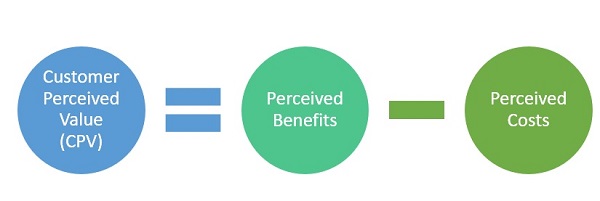Customer Perceived Value (CPV) - Definition, Importance & Example
What is Customer Perceived Value (CPV)?
Customer Perceived Value is the evaluated value that a customer perceives to obtain by buying a product. It is the difference between the total obtained benefits according to the customer perception and the cost that he had to pay for that. Customer perceived value is seen in terms of satisfaction of needs a product or service can offer to a potential customer. The customer will buy the same product again only if he perceives to be getting some value out of the product. Hence delivering this value becomes the motto of marketers.
Measuring Customer Perceived Value
Customer Perceived Value = Total Perceived Benefits – Total Perceived Costs
The CPV is kind of an evaluation done by customer on what value a product or a service would be able to provide if he/she buys it by paying money.
Please note that the benefits and costs also include the emotional benefits and costs.

Importance of CPV
Customer Perceived Value becomes very important for making sure that the customer becomes repeat. If the CPV is positive then only there would be a probability of repeat buy else the customer would switch to a competitor. CPV can be measured by taking in account all types of values like task, time, functional etc. to make sure it fulfills the expected value by the customer.
Example of Customer Perceived Value
While buying a car, the expected reactions from family and friends also become a part of benefits or gain. The customer evaluates whether the particular car would be able to provide whatever he/she is looking for from a car. Whether the car would provide the comfort and the usability. Also for many customer the perceived value would also include the mileage a car gives.
Hence, this concludes the definition of Customer Perceived Value (CPV) along with its overview.
This article has been researched & authored by the Business Concepts Team. It has been reviewed & published by the MBA Skool Team. The content on MBA Skool has been created for educational & academic purpose only.
Browse the definition and meaning of more similar terms. The Management Dictionary covers over 1800 business concepts from 5 categories.
Continue Reading:
What is MBA Skool?About Us
MBA Skool is a Knowledge Resource for Management Students, Aspirants & Professionals.
Business Courses
Quizzes & Skills
Quizzes test your expertise in business and Skill tests evaluate your management traits
Related Content
All Business Sections
Write for Us